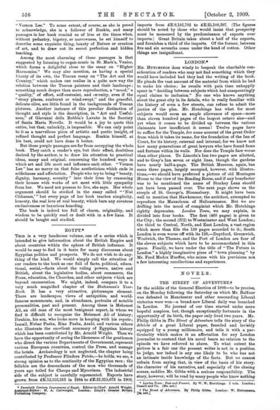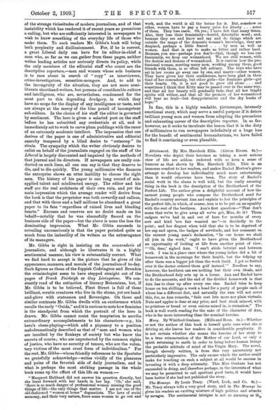NOVELS.
THE STREET OF ADVENTURE.t Ix the middle of the General Election of 1906—to be precise, on the Monday following the Saturday on which Mr. Balfour was defeated in Manchester and other resounding Liberal victories were won—a brand-new Liberal daily was launched in London. No journal of our time started under more hopeful auspices, but, though exceptionally fortunate in the opportunity of its birth, the paper only lived two years. Mr. Philip Gibbs in The Street of Adventure tells the story of the dein-ids of a great Liberal paper, founded and lavishly equipped by a young millionaire, and tells it with a par- ticularity which makes it an affectation for any London journalist to contend that his novel bears no relation to the episode we have referred to above. To what extent the picture is a fair one the present writer is not in a position to judge, nor indeed is any one likely to be who has not an intimate inside knowledge of the facts. But we cannot refrain from saying that, in view of the basis of his story, the character of his narrative, and especially of the closing scenes, saddles Mr. Gibbs with a serious responsibility. The story, however, will be read by many people who know nothing
• London Town Past and Present. By W. W. Hutchings. 2 vols. London; Cassell and Co. [20s. net.]
t The Street of Adventure. By Philip Gibbs. London; W. Heinemann, [Si. net.]
of the strange vicissitudes of modern journalism, and of that instability which has rendered it of recent years so precarious a calling, but who are sufficiently interested in newspapers to wish to know something of the everyday life of those who make them. To such readers Mr. Gibbs's book will bring both perplexity and disillusionment. For, if he is correct, a great Liberal daily can have for its editor-in-chief a man who, so far as we can gather from these pages, neither writes leading articles nor seriously directs its policy, while the only members of the editorial staff who count are the descriptive reporters,—men and women whose sole business is to race about in search of " copy " as interviewers, crime-investigators, sensation-mongers. And, to add to the incongruity of the situation, they are not mere semi- literate shorthand-writers, but persons of considerable culture and intelligence, who are, nevertheless, condemned for the most part to this degrading drudgery, in which they have no scope for the display of any intelligence or taste, and are always at the mercy of the blue pencil of incompetent Bub-editors. In the choice of his staff the editor is governed by sentiment. The hero is given a salaried post on the staff before he has submitted any credentials at all, and is immediately set to work to carve plum puddings with the razor of an extremely academic intellect. The impression that one derives of the paper is one of administrative and editorial anarchy tempered by a blind desire to " outscoop " its rivals. The sympathy which the writer obviously desires to
enlist on behalf of the journalists engaged on the staff of the Liberal is largely discounted and impaired by the methods of that jottrnal and its directors. If newspapers are really con- ductefl on such lines, all one can say is that they deserve to die, and to die quickly. The young millionaire who finances the enterprise shows an utter inability to choose the right
men. The history of his paper is one long record of mis- applied talent and misdirected energy. The editor and his staff are the real architects of their own ruin, and yet the main impression which the average reader will derive from the book is that the proprietor was both cowardly and callous, and that with three and a half millions he abandoned a great paper to its fate "regardless of ruined lives and bleeding hearts." Excuses and reserves are no doubt made on his behalf—notably that he was shamefully fleeced on the business side of the paper—but the above is none the less the dominating impression. What Mr. Gibbs succeeds in revealing unconsciously is that the paper perished quite as much from the imbecility of its writers as the extravagance of its managers.
Mr. Gibbs is right in insisting on the camaraderie of journalists, and although be illustrates it in a highly sentimental manner, his view is substantially correct. What we find hard to accept is the picture that he gives of the appearance, manners, and morals of the journalists of to-day. Such figures as those of the foppish Codrington and Brandon the criminologist seem to have stepped straight out of the pages of Frank Fairleigh or Guy Livingstone. We con- stantly read of the extinction of literary Bohemians, but, if Mr. Gibbs is to be believed, Fleet Street is full of these brilliant, erratic creatures who live in the slums, yet are hand- and-glove with statesmen and Sovereigns. On these and similar contrasts Mr. Gibbs dwells with an exuberance which recalls the early " Ouida," and it is curious to note how feminine
is the standpoint from which the portrait of the hero is drawn. Mr. Gibbs cannot resist the temptation to ascribe extraordinary accomplishments to his characters—e.g., his hero's chess-playing—which add a piquancy to a position melodramatically described as that of "men and women who are insulted by the flunkeys of society but who know the secrets of courts ; who are unprotected by the common rights
of justice, who have no security of tenure, who are the volun. tau victims of the most cruel form of individualism." For the rest, Mr. Gibbs—whose friendly references to the Spectator we gratefully acknowledge—writes vividly of the pleasures and pains of the feverish side of daily journalism, and in what is perhaps the most striking passage in the whole book sums up the effect of this life on women Margaret Hubbard did not answer his question directly, but she leant forward with her hands in her lap. Oh,' she said, there is so much danger of professional women missing the good things of life—the only things that matter. I am not one of the old-fashioned "women at home" dogmatists. The laws of social economy, and their very nature, force some women to go out and work, and the world is all the better for it. But, somehow or other, women have to pay a heavy price for liberty . . • some of them. They lose caste. Oh yes ; I have felt that many times. Also, they lose their femininity—horrid, detestable word ; and, because they see and know and say and do things which are outside the range of the domestic woman's knowledge, they are despised, perhaps a little feared . . . by men as well as women. And that is apt to make us bitter and rather hard. Because, you see—perhaps you don't—that, though we lose our femininity, we keep our womanhood. We are still women, with the desires and dreams of womanhood. It is curious how the pro- fessional woman, meeting many men, working among them, good friends with them, is so often left solitary. The boys who have sat in her rooms go away one. by one, and marry—other women. They have given her their confidences, have been glad in their time of her comradeship, but other girls—the feminine girls—get their hearts. Oh, it is not good to grow old alone . . . and sometimes I think that Kitty may be passed over in the same way, and that all her beauty will gradually fade, that all her bright spirits will wither, and that all the promise of her womanhood will bear no fruit—but disappointment and the dry husks of hope."
In fine, this is a highly readable, picturesque, intensely emotional story, which may serve a useful purpose if it deters brilliant young men and women from adopting the precarious and exhausting career of the descriptive reporter. In so far, however, as it seeks to inculcate the lesson that it is the duty of millionaires to run newspapers indefinitely at a huge loss for the benefit of sentimental humanitarians, we have failed to find it convincing or even plausible.



























































 Previous page
Previous page